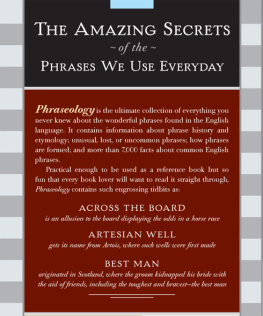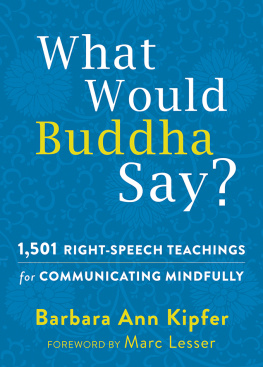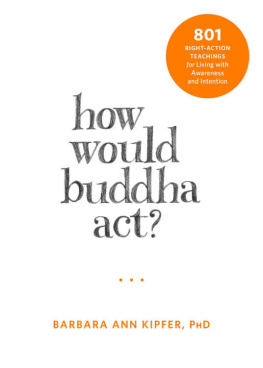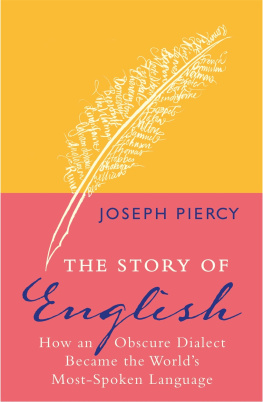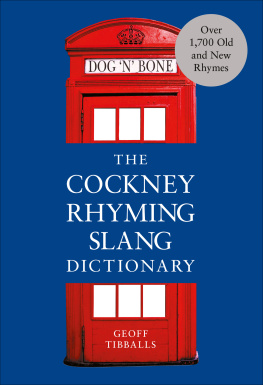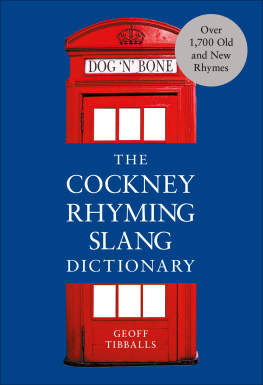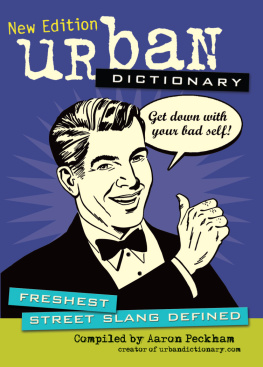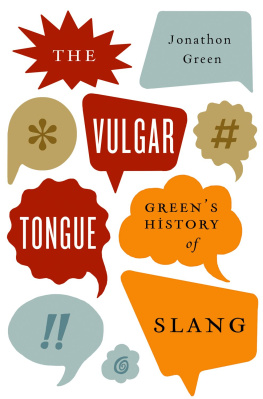DICTIONARY OF
American Slang
FOURTH EDITION
BARBARA ANN KIPFER Ph.D.
Editor
ROBERT L. CHAPMAN Ph.D.
Founding Editor

CONTENTS
PREFACE
To the Fourth Edition
T HE EDITOR OF A DICTIONARY OF SLANG owes explanations to the general reader about why such a book is made, how it was made, and how to use it. Also, the editor must attempt to explain what slang is and the history of slang lexicography.
Why This Book Was Made
Why devote a book to this sort of uncouth language? Dictionaries are popularly thought to have strong influence, giving validity and authority to the entries and therefore having social and moral impact. A dictionary like this, which specializes in terms not to be lightly used in polite society, may therefore be thought of as teaching and advocating these terms.
Theoretically in linguistics, any corpus or body of vocabulary is worth recording. Lexicography is a science in that it values accuracy, completeness, and demonstrability. As a lexicographer, I collect and record slang because it is therebut this has been done carefully and responsibly. It is up to the reader to also be careful and responsible in using these powerful and provocative words.
Yes, children may sneak off into corners with this book and find dirty wordsbut the printed book is now challenged and often superseded as a source of these terms by films, television programs, and the Internet. These terms are no longer kept quietly in books, but at least in a book such as this, the words are explained, their usage offered, and histories described when available.
History of Slang Lexicography
In historical justification, this book joins itself to an Anglo-American tradition going back a little more than 200 years. Credit as founder of general slang lexicography (as distinct from those who dealt in specialized lexicons of the vocabularies of thieves and tramps) goes to the distinguished British antiquarian Francis Grose, who published A Classical Dictionary of the Vulgar Tongue in 1785. After two further editions, the book became the basis of an 1811 updating and expansion called Lexicon Balatronicum: A Dictionary of Buckish Slang, University Wit, and Pickpocket Eloquence, with nearly 5,000 defined entries. Groses book and its successor include the slang of the so-called balatrones, jesters, buffoons, contemptible persons; literally babblers, and of learned humorists, those of the universities, as well as of thieves.
Groses work held on until it was superseded in 1859 by John C. Hottens A Dictionary of Modern Slang, Cant, and Vulgar Words, which had new editions through 1874. Then, in 1887, Professor Albert M.V. Barrere published Argot and Slang: A New French and English Dictionary at his own expense until Ballantyne Press offered the 956 pages by subscription two years later as A Dictionary of Slang, Jargon, & Cant. Barreres collaborator was Charles Godfrey Leland, the first American to figure prominently in general slang lexicography. The dictionary embraced English, American, and Anglo-Indian slang, Pidgin English, tinkers jargon and other irregular phraseology.
In 1890, the first volume of John Stephen Farmer and William Ernest Henleys Slang and Its Analogues was published; volume 2 came the following year and the subsequent five volumes through 1904. The total number of pages published was 2,736.
After Farmer and Henley, good general slang lexicography was not resumed until 1937, when Eric Partridge brought out the first edition of his masterwork, A Dictionary of Slang and Unconventional English, which was updated and enlarged in numerous editions and printings by Partridge himself through 1980, as well as posthumously to the present. Partridge was an important lexicographer and scholar, as well as a teacher, essayist, and novelist. He is credited with making slang lexicography more or less respectable.
The first full-scale dictionary of American slang appeared in 1960 when Harold Wentworth and Stuart Berg Flexners Dictionary of American Slang was published by Thomas Y. Crowell (a company later incorporated into HarperCollins). Professor Wentworth had previously written the American Dialect Dictionary, portions of which were adapted for the slang dictionary. Flexner added thousands of slang definitions and wrote the invaluable preface, a wonderful treatment of the sociolinguistics of slang, last printed in the 1986 New Dictionary of American Slang. He also did the analytical work reflected in that books appendix, which treated the processes of word-formation in slang. The 700-page Wentworth and Flexner was enlarged and updated in 1967 and 1975, and it is the basis of the present book.
The development of slang is swift and widespread. One may question how a print dictionary can hope to be accurate or up-to-date in the Internet age. The answer is, it cannot be; it is a snapshot in time. The analysis of what to include is much more important for a print dictionary, then, because it is essential to attempt to determine what words and meanings have lasting value versus ephemeral uses. Because of the enormity of the American slang vocabulary, no print or online dictionary is close to comprehensive despite the hard work of slang lexicographers.
The Internet is a dispenser, expediter, enhancer, and preserver of slang that must be entered into with a bit of caution. Any person or group can describe its slang vocabulary for the world to access, updated as often as daily. There are a growing number of glossaries and full-scale dictionaries online, spreading new slang. Much of the material is raw, unfiltered, and untouched by professional linguists or lexicographers. It is interesting, possibly useful, but not comparable with well-researched books.
How This Book Was Made
The book has a primary utility for people who find slang terms in speech or writing and need help with their meaning. It also serves readers who just plain enjoy slang and are curious about the particulars, such as usage and etymology. This book is intended for the general reader and does not include some of the very specialized vocabulary of subcultures. The aim is to describe terms that have gained a kind of broad acceptance and use.
The previous edition was analyzed for its user-friendliness, and decisions were made to change some of the format of the entries, the order of the senses, etc. The basic policies of this new edition remain the same: that it is to be a general dictionary of current American slang rather than a collection of special vocabularies, a scholarly historical treatment, or a book with a regional or other bias.
The Wentworth and Flexner Dictionary of American Slang remains the seed, and its wealth of material has been worked with over the years, retaining much, discarding some, and reviewing/revising all.
The new resource of the Internet/World Wide Web has certainly played a part in collecting and identifying new material, as well as standard lexicographic collection methods. Many Web sites describing slang terms exist, but almost none are authoritative in the sense that they have been assembled by trained lexicographers. However, that does not mean that they are not a great resource. Many Internet collections were examined, along with print collections of slang, in deciding what to include in this edition, as data for definition-writing, and for examples of usage.
The definitions, examples of usage, and etymologies of the third edition were examined and reedited for entries retained from the previous edition. Two appendices are in this edition: the various words for drunk, intoxicated, and intoxicated by drugs, and a guide to text-messaging abbreviations. The vocabulary for drunk/drugged/intoxicated is large and ever-growing; the technical development of text messaging has added a new form of abbreviated communication to our culture.
Next page

